Readings Newsletter
Become a Readings Member to make your shopping experience even easier.
Sign in or sign up for free!
You’re not far away from qualifying for FREE standard shipping within Australia
You’ve qualified for FREE standard shipping within Australia
The cart is loading…






This title is printed to order. This book may have been self-published. If so, we cannot guarantee the quality of the content. In the main most books will have gone through the editing process however some may not. We therefore suggest that you be aware of this before ordering this book. If in doubt check either the author or publisher’s details as we are unable to accept any returns unless they are faulty. Please contact us if you have any questions.
The doctrine of Scripture determines precisely how theology is done and what authority theological statements–including those in sermons, dogmatic texts, and confessional writings–possess. At stake is nothing less than truth itself and the possibility of communicating the truth of Christ to mankind.
This book compares the pre-modern approach to Scripture, following early Christian theologians, Martin Luther, and historic Lutheranism, with modernism, starting with Socinianism and continuing with Enlightenment philosophers and recent modern theologians, especially the neo-orthodox. These differences are most clearly visible in the doctrine of Scripture, especially its inspiration, and the method for establishing true facts. Modern theology starts with scientific truth as a given and will not go against it. Pre-modern Christianity started with Scripture and assumed its inerrancy, by virtue of its speaker: God, who is inerrant.
Modernism is not easily defined in traditional terms, but it represents an overturning of biblical Christianity. In academic theology confessing and sure facts are disallowed by scientific and scholarly doubt. Modernism, or Enlightenmentism, explains why bold Christian confessing has diminished. Modern exegesis and hermeneutics are the primary obstacles.
The destructive role of modernism and scientific values in historically confessing churches is explored, using the Lutheran Church–Missouri Synod as an example.
$9.00 standard shipping within Australia
FREE standard shipping within Australia for orders over $100.00
Express & International shipping calculated at checkout
This title is printed to order. This book may have been self-published. If so, we cannot guarantee the quality of the content. In the main most books will have gone through the editing process however some may not. We therefore suggest that you be aware of this before ordering this book. If in doubt check either the author or publisher’s details as we are unable to accept any returns unless they are faulty. Please contact us if you have any questions.
The doctrine of Scripture determines precisely how theology is done and what authority theological statements–including those in sermons, dogmatic texts, and confessional writings–possess. At stake is nothing less than truth itself and the possibility of communicating the truth of Christ to mankind.
This book compares the pre-modern approach to Scripture, following early Christian theologians, Martin Luther, and historic Lutheranism, with modernism, starting with Socinianism and continuing with Enlightenment philosophers and recent modern theologians, especially the neo-orthodox. These differences are most clearly visible in the doctrine of Scripture, especially its inspiration, and the method for establishing true facts. Modern theology starts with scientific truth as a given and will not go against it. Pre-modern Christianity started with Scripture and assumed its inerrancy, by virtue of its speaker: God, who is inerrant.
Modernism is not easily defined in traditional terms, but it represents an overturning of biblical Christianity. In academic theology confessing and sure facts are disallowed by scientific and scholarly doubt. Modernism, or Enlightenmentism, explains why bold Christian confessing has diminished. Modern exegesis and hermeneutics are the primary obstacles.
The destructive role of modernism and scientific values in historically confessing churches is explored, using the Lutheran Church–Missouri Synod as an example.